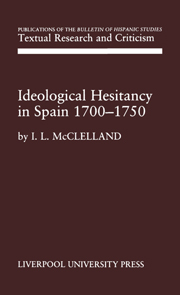Book contents
- Frontmatter
- Contents
- Dedication
- Preface
- CHAPTER 1 Reason of Unreason in the Spanish Vulgo
- CHAPTER 2 The False Alarm of ‘Scepticism’
- CHAPTER 3 The Vulgo-Conception of Scientific Evidence
- CHAPTER 4 The Psychological Significance of Pulpit Oratory
- CHAPTER 5 Witness of the Popular Stage
- CHAPTER 6 The Disturbing Effects of the Periodical Press
- Index
CHAPTER 5 - Witness of the Popular Stage
- Frontmatter
- Contents
- Dedication
- Preface
- CHAPTER 1 Reason of Unreason in the Spanish Vulgo
- CHAPTER 2 The False Alarm of ‘Scepticism’
- CHAPTER 3 The Vulgo-Conception of Scientific Evidence
- CHAPTER 4 The Psychological Significance of Pulpit Oratory
- CHAPTER 5 Witness of the Popular Stage
- CHAPTER 6 The Disturbing Effects of the Periodical Press
- Index
Summary
The fact that the average preacher, popular orator, or popular scribbler, during at least the first half of the eighteenth century, sought to inflame the interest of a cross-class vulgo by relying on corral(courtyard theatre-) affectations of speech and tone, gives psychological significance to the type of drama being produced at that period. Specifically, it calls attention to mental and emotional assumptions in his public which the popular dramatist could take for granted, and to which successful actors related their vocal effects. Popular public speakers in any period have tended to mimic the techniques of popular entertainers, and ultimately, therefore, to be indebted to the entertainers' scripts. In times of literary decadence such debts become more noticeable, and during Spain's descent from her Golden-Age peaks they are bleakly conspicuous.
The reciprocal influence of drama on audiences, and audiences on drama, as paralleled nowadays in television entertainment, is indisputable, and apparently operates in general either to their mutual intellectual improvement or mutual deterioration. But in a period of relative decadence, intellectual and artistic, the lack of some dominating stimulus, emanating from the individuality of a creative genius, means that both authors and audiences are left to stagnate on plains of empty emphasis and unexacting repetition, rather than become alerted disturbingly to potentialities of innovation.
- Type
- Chapter
- Information
- Ideological Hesitancy in Spain 1700-1750 , pp. 121 - 137Publisher: Liverpool University PressPrint publication year: 1991



